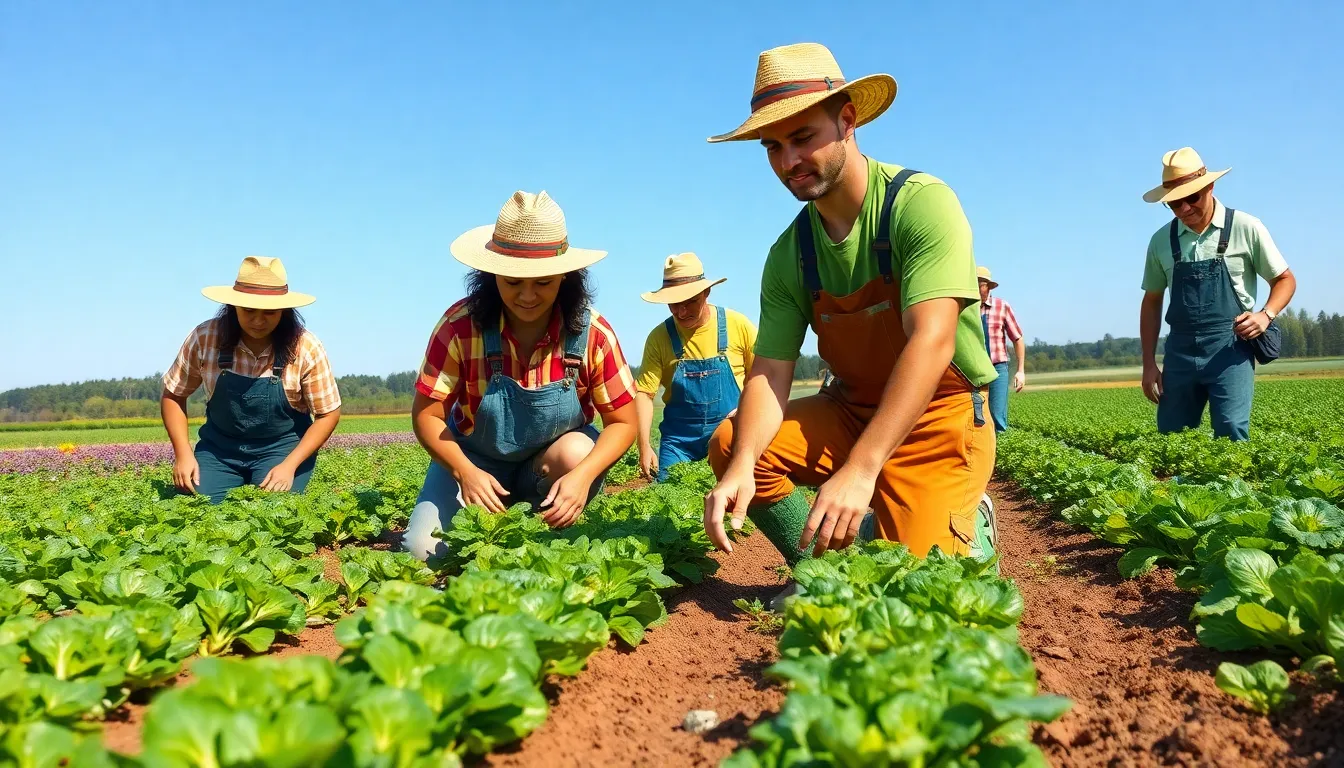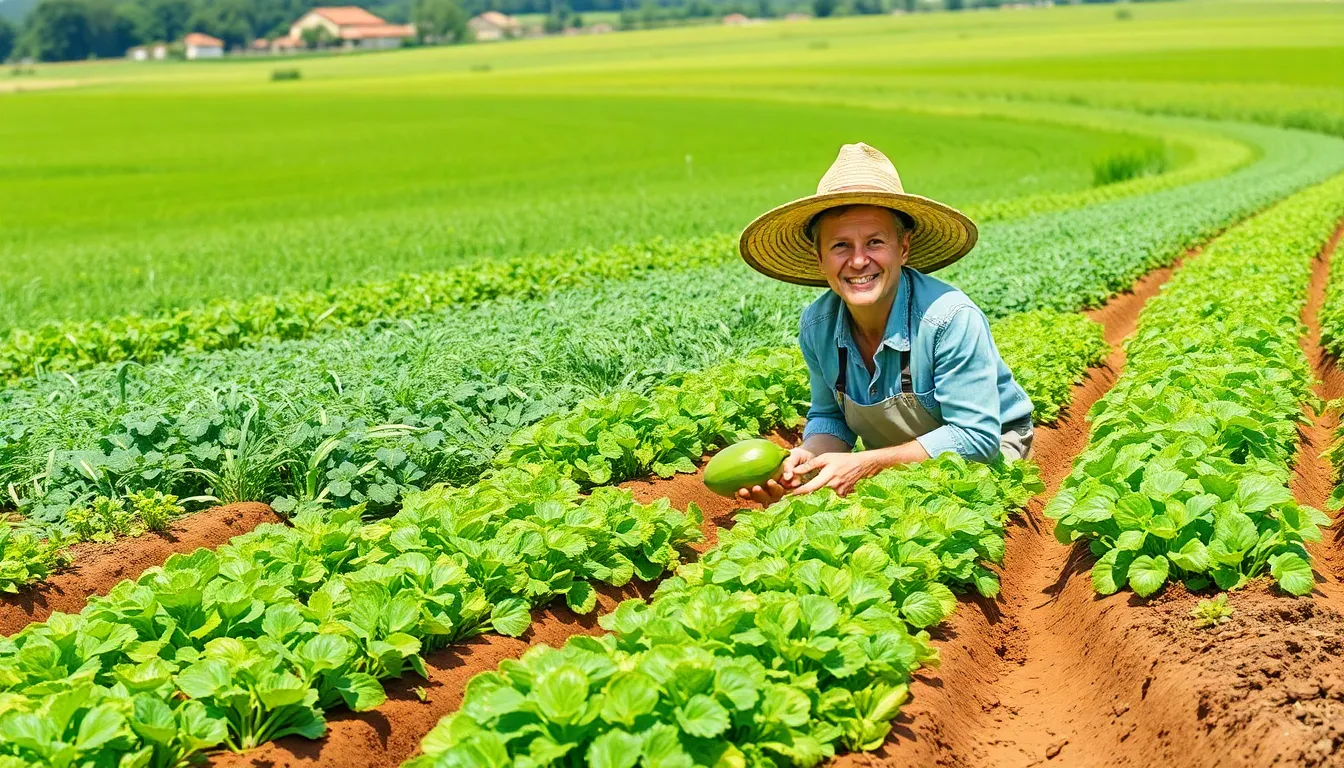The Best Fluffy Pancakes recipe you will fall in love with. Full of tips and tricks to help you make the best pancakes.

In a world where the average person spends more time scrolling through social media than tending to their garden, organic farming emerges as the unsung hero of environmental sustainability. Picture this: while conventional farming might be tossing chemical fertilizers around like confetti at a party, organic farming is quietly nurturing the soil and promoting biodiversity. It’s like the difference between a wild dance party and a serene yoga retreat.
But it’s not just about avoiding chemicals; organic farming has a ripple effect that extends far beyond the farm gate. From reducing greenhouse gas emissions to enhancing soil health, the benefits are as plentiful as a summer harvest. So let’s dig into the dirt and uncover how organic farming isn’t just good for the planet—it’s a game-changer for our future.
Organic Farming Environmental Impact
Organic farming emphasizes sustainable practices that enhance environmental health. This approach involves avoiding synthetic fertilizers and pesticides, which reduces chemical runoff into waterways. By focusing on natural inputs, organic farms improve biodiversity and promote healthier ecosystems.
Crop rotation plays a vital role in maintaining soil fertility and controlling pests naturally. Cover crops enrich the soil with nutrients, minimizing erosion and enhancing water retention. Organic farming also uses compost, which returns valuable organic matter to the earth, building overall soil health.
Research shows organic farming can lead to lower greenhouse gas emissions. Studies indicate that organic farms often release significantly less carbon dioxide compared to conventional methods. In fact, organic techniques contribute to carbon sequestration, capturing carbon in the soil and mitigating climate change impacts.
Farmers practicing organic methods often employ integrated pest management strategies. By balancing pest populations through natural predators, they reduce the need for chemical interventions. This practice not only supports food webs but also enhances resilience against pest outbreaks.
Organic farming benefits not just the farm but surrounding communities as well. It fosters local economies by encouraging small-scale farming and reducing reliance on industrial agriculture. Additionally, it promotes food safety, as organic produce contains fewer pesticide residues, benefiting consumers directly.
Collectively, these practices contribute to a sustainable model that upholds ecological integrity. Each decision made on an organic farm reflects a commitment to preserving environmental resources for future generations.
Benefits Of Organic Farming

Organic farming offers several environmental advantages that contribute to sustainable practices. These benefits encompass soil health, biodiversity, and ecosystem vitality.
Soil Health Improvement
Soil health significantly improves under organic farming practices. Farmers often utilize methods like crop rotation and cover cropping, enhancing organic matter and reducing soil erosion. Nutrient cycling occurs more efficiently without synthetic fertilizers, promoting healthier plant growth. Research shows organic soils possess higher microbial activity, which supports nutrient uptake in crops. Enhanced soil structure improves water retention, reducing runoff and preserving water resources. According to the Rodale Institute, organic farming can increase soil carbon stocks by an average of 1.15 metric tons per hectare annually. These practices foster resilience against climate fluctuations and environmental stressors.
Biodiversity Enhancement
Biodiversity increases through organic farming approaches that focus on ecosystem health. Organic farmers often plant diverse crops, creating habitats for various species, including pollinators and beneficial insects. This diversity aids pest control, diminishing the necessity for chemical pesticides. Integrated pest management techniques support natural predators, allowing ecosystems to thrive without relying on artificial interventions. Research indicates that organic fields host, on average, 30% more plant and insect species than their conventional counterparts. Protecting natural habitats encourages a balance of species, which contributes to long-term agricultural sustainability. Organic practices restore balance, promoting healthy ecosystems and resilient agricultural systems.
Environmental Challenges
Organic farming faces various environmental challenges, impacting its overall sustainability. While it promotes eco-friendly practices, certain issues remain.
Water Usage
Water conservation presents a critical challenge for organic farming. Although organic practices often involve less intensive irrigation methods, the reliance on rainfall makes farmers vulnerable to water shortages. Crop diversity in organic systems can enhance resilience, yet some regions experience extreme droughts, which threaten yield stability. Organic farms typically use 20% more water compared to conventional farms, driven by the need for efficient irrigation systems. Implementing rainwater harvesting and drip irrigation techniques can mitigate this impact, ensuring that organic farming remains sustainable while conserving vital water resources.
Pesticide Use
While organic farming prioritizes natural pest management, the use of pesticides still poses challenges. Organic farms employ alternatives like neem oil and beneficial insects, yet these solutions might not always provide complete pest control. Pests can adapt, requiring increased intervention over time. Additionally, organic practices face challenges with disease outbreaks that traditional pesticides may control effectively. Despite lower toxicity levels, organic pesticides can still harm beneficial organisms if not managed carefully. Understanding the balance between pest management and ecological health remains crucial for enhancing the sustainability of organic practices.
Comparison With Conventional Farming
Organic farming practices contrast sharply with conventional farming methods. Conventional farming often relies heavily on synthetic fertilizers and pesticides, which can lead to soil degradation and water pollution. By contrast, organic methods prioritize natural inputs, enhancing soil fertility without the chemical burden.
Soil health differs significantly between these two approaches. Organic farms typically exhibit greater microbial activity, promoting nutrient uptake and improving water retention. Studies reveal that organic soil retains up to 30% more moisture than conventional soil, vital in drought-prone areas.
Biodiversity also thrives in organic systems. Organic farms commonly host more plant and insect species, creating healthier ecosystems. Conventional fields, reliant on monocultures, lack this diversity, making them more susceptible to pests and diseases.
Water usage presents another critical difference. Organic farmers may consume about 20% more water than their conventional counterparts, primarily due to reliance on natural rainfall. Implementing efficient irrigation techniques can minimize this difference, ensuring more sustainable water management.
Pest management varies significantly between farming methods. Integrated pest management in organic farming emphasizes ecological balance and natural predators. Conversely, conventional methodologies often involve chemical interventions that can disrupt local ecosystems.
Overall, the environmental impact of organic farming tends to be less harmful. Organic methods enhance soil health, promote biodiversity, and reduce pollution levels. In contrast, conventional practices frequently contribute to environmental degradation. Each farming method exhibits distinct attributes impacting agricultural sustainability and ecological health.
Future Of Organic Farming
Innovations in organic farming methods continue to emerge, presenting opportunities for increased sustainability. Precision agriculture technologies play a critical role in optimizing resource use and improving yields. Advanced data analytics enable farmers to monitor crop health and soil conditions, fostering better decision-making.
Investments in organic farming research are essential for developing new techniques that align with environmental goals. Trials on nutrient management and pest control enhance the resilience of organic systems. Funding initiatives from governments and non-profits can support these advancements, driving growth in this sector.
Climate change significantly affects agricultural practices, requiring adaptation among organic farmers. Utilizing drought-resistant crop varieties can minimize water usage, addressing water conservation issues raised in earlier discussions. Organic farming practices benefit from collaboration with environmental organizations, promoting sustainable land use and biodiversity.
Consumer demand for organic products continues to rise, shaping the future market landscape. As consumers become more environmentally conscious, the preference for organic goods increases. This demand encourages farmers to expand organic practices and invest in certified organic production methods.
Transitioning from conventional to organic farming presents challenges but offers significant long-term rewards. Infrastructure changes, such as building organic supply chains, support this transition. Anticipating market needs and consumer trends will position organic farms favorably in the agricultural industry.
Ecosystem services provided by organic farms contribute to their sustainability. These practices enhance pollination and improve soil structure, ultimately supporting long-term agricultural productivity. Growing awareness of these benefits strengthens the case for organic farming as an essential component of future food systems.
Prioritizing sustainable practices will dictate the trajectory of organic farming. Shift in focus towards carbon sequestration and biodiversity initiatives will enhance environmental contributions. Overall, organic farming stands to play a pivotal role in mitigating environmental challenges while securing food systems for future generations.
Conclusion
Organic farming stands as a beacon of hope for environmental sustainability. By prioritizing natural practices over synthetic inputs it fosters healthier ecosystems and promotes biodiversity. The methods employed not only enhance soil health but also contribute to carbon sequestration efforts crucial in combating climate change.
While challenges remain such as water conservation and pest management the ongoing innovations within organic farming continue to pave the way for a sustainable future. As consumer demand for organic products rises the industry is likely to evolve further. The commitment to sustainable practices will undoubtedly shape the landscape of agriculture ensuring that future generations inherit a healthier planet.
